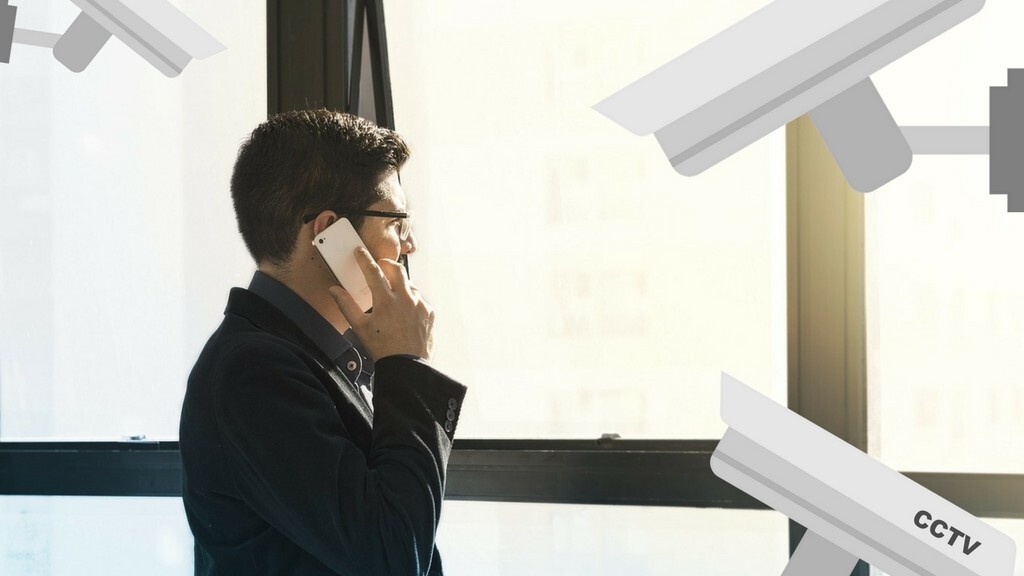
“No, I don’t think that’s such a big deal, I have no problem with the app running on my private phone,” said my friend back when his company (one of the biggest oil companies in the world) decided to ‘gift’ all of their employees a shiny new app meant to track them while at work. He was new at the job, been there only for a couple of weeks, still hadn’t got his business phone, and he really didn’t believe he should be concerned to have a tracking app on his phone.
“Okay, I’m going insane. Guys from workplace safety just messaged me, informing me that I didn’t place my hand on a handrail when climbing stairs, but that’s not all. This damn app warned me when I was out for lunch, telling me I will be late if don’t head toward the building in the next three minutes. Crazy man, just crazy.”
That was a few weeks after he and all of his co-workers got the app, and after he realized that all employees are being constantly monitored by people from workplace safety department (not just by the app but also via numerous surveillance cameras placed all over the building).
After a week or so, my friend really got troubled by the tracking app. He realized it tracks his position even when not at work, and that his phone runs out of juice much sooner than before the tracking app was installed. The handrail detail is here just to emphasize the level of employee monitoring in the company, and just how onerously big international companies can look down on their employees as resources, and not actual, living and breathing persons.
Combine that with employee tracking apps that are too often really stepping out of the line – hurting privacy and making workers paranoid – and you have a perfect example of how employee tracking can go south. As for my friend, he eventually received his business phone, deleted the app from his private phone, and now keeps his business phone at his place at all times, carrying it to work and then coming home right after work to put it inside his work desk, every single day, even when he has something planned after work.
Talk about commitment. And talk about negative sides of employee tracking.
While your off-work privacy is the most important thing that can be compromised if your employee decides to “gift” you and your co-workers an employee tracking app, there are other, smaller in reach but equally important causes for concern when you are being tracked at work (and outside it, in some cases). Let us see what all of us should be worried about, and what we can do about it.
1. Infringing off-work privacy by running the app during off hours
Our privacy is becoming less and less private, and if your employee decides to start tracking you, make sure the tracking app is either installed on your business phone or has an option for explicitly turning the tracking off. Because no employer should know where we are and what we are doing outside work hours.
This can be a serious concern, especially if you do not have a business phone, or if you must carry it with you at all times. Now, the perfect scenario is that the app has an option to turn off location tracking during off hours, but if it doesn’t, there are some ways to turn location sharing off on your smartphone.
If you own an Android device running Android 6.0 or newer, there is an option to deny app permissions to individual apps. Just go to Settings > General > Apps > Configure apps or App settings, and then enter the option called App permissions. Inside the option, you will find a list of all app permissions. Just enter location permissions, find the location tracking app and turn the location permission off.
If you own an iPhone, iOS 11 offers a way to turn off location services for specific apps. Just go to Settings > Privacy > Location Services, then scroll down until you find the employee monitoring app and the tap on it and select “Never: Prevents access to Location Services information.” That should be it, and the app shouldn’t be allowed to track your movements.
2. Installing employee tracking app on your private phone
This is probably the worst case scenario when it comes to employee monitoring. If you don’t have a company-issued smartphone, you can be out of luck and have an employee tracking app installed on your private phone. Like the aforementioned problems my friend had when the company installed a tracking app on his private phone, having an employee tracking app on your private phone can lead to all sorts of problems.
Since most of the apps show your movement on Google Maps, your boss can know if you went for a beer or two to a nearby bar, or if you decided to go to a party along with knowing when you returned home. This can lead to major stress situations, and ultimately can be used for controlling workers, especially if you decide to disable location tracking during off-hours. So, again, it is essential that the location tracking app your employer uses has an option to turn off tracking after you leave work.
The best case scenario is that the app can track you only if you’re inside the building or job site area where you work, but that’s not always the case. So, if you have the option to ask for a business phone, use it.
3. Messing up your smartphone with an unoptimised tracking app
Okay, let’s say you got an employee tracking app and that you are okay with your boss using it for monitoring your work-related activities. And let’s say the app is off during off-hours, it is installed on your private device and your employer did everything to make you comfortable while having it on the device.
But what about optimisation? Many apps, especially those that use GPS can be serious battery hogs, and especially employee tracking ones that are turned on at all times during work. Combine that with an unoptimized mess of an app that not just eats battery as an hors-d’oeuvre but also takes processing power and just swallows it whole?
If you have software on your device capable of draining the battery in a matter of hours, you should be concerned. If your employer decided to install a tracking app on workers’ phones, at least he or she should test a couple of solutions before picking one in order to give employees the best possible option.
4. An employer who puts more trust in the app than in time cards
John Halpin’s case showed how a tracking app could lead to an employee being fired because the company put its trust in the tracking app, which showed that John left work early, many times.
Now, although this may seem like an advantage of having employee tracking app, it may lead to some problems for workers. For instance, the app can show an employee leaving early only because they had to exit the building because of some urgent business or to grab a bite to eat.
And what if you decide to come early in order to finish all work before the end of your shift so you can leave early? This happened to John since he frequently stayed late at work, but that didn’t matter because the app didn’t count overtime hours.
The app can become bugged, it can fail to resume tracking after a worker entered the building, or it can send an automatic notification to HR department notifying them the worker left early but failing to report they returned to the work place. And, even worse, the employer can issue a company phone with a location tracking app without worker’s knowledge, which is another significant concern for workers.
5. Getting a company phone with hidden GPS tracking software
Again, let’s talk about John Halpin. He ended up being fired, but in his defense, he didn’t know that the tracking software was installed on his phone, and this can be a major reason for concern.
You see, in many countries, companies can install the software on workers’ business phones without their knowledge, and this can lead to many problems.
Your privacy can be endangered, you can be tracked without your knowledge, and ultimately your employer can misuse the software to track you outside of work hours, which is the most serious potential issue of employee tracking software.
Unfortunately, you cannot do anything about this, if your boss has means of installing tracking software on company-issued devices, you just have to trust them they won’t take advantage of you, and they will behave fairly. But hidden software can be a serious issue of concern.
6. Forcing you to install the app on both your private and business devices
This is probably the worst case scenario when it comes to employee tracking software. If your boss wants the app to be installed both on your private and business device, you definitely should protest because, if you already have a company-issued device, there shouldn’t be any reason of equipping a private device with tracking software.
So, if you get into a situation like this one, just go public, or try putting a public protest because no one should have a right to invade your private space, and this is exactly what an employee would do if insisting that software should be present on both business and private devices.
7. A tracking software with poor security measures
Since most employee tracking software works by sending data (location, movement, work hours, and other types) to a server usually located in the company’s headquarters, the software should employ high-security measures.
If not, you could be faced with data leaks that could expose your movements during work, but also during off hours. Further, your device can end up being hacked because of poor security.
If the app asks for some critical permissions (like sending SMS and making calls in order to inform management if you are running late for work, or using mobile data for sending location info) and features poor security is could be possible for hackers to remotely control your phone, which is a massive reason for concern.
8. Increasing occupational stress levels
Work related (in common language) stress is becoming a bigger and bigger problem, with workers having to be more productive, take shorter breaks and to work more hours during the week.
The phenomena is one of the most researched subjects in organisational psychology with tens of thousands of occupational stress-related articles published just in 2017. And for a good reason as work related stress can be a trigger for many diseases and is the main cause of the burn-in syndrome, a modern disease that hits people who just can’t cope with numerous problems at work.
And having a tracking app constantly following your movements, or productivity, can seriously raise occupational stress levels. If your job is highly stressful, it can only become worse with employee tracking software and can be a serious reason for concern.
Conclusion
Employees have rights. The status and rights of a person in a society shouldn’t degrade when they are in the role of an employee at a company. It is important for employees to stand up for their rights and push back when employers overstep boundaries. GPS tracking is a powerful tool, but is always a potential invasion of privacy.
Get the TNW newsletter
Get the most important tech news in your inbox each week.





